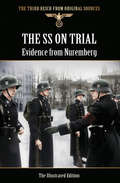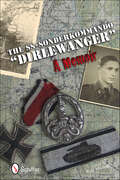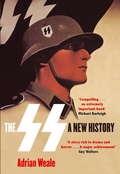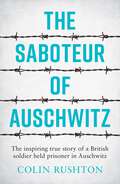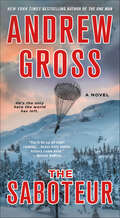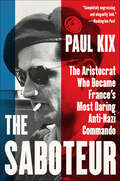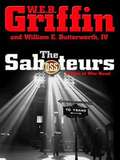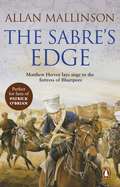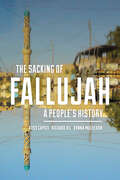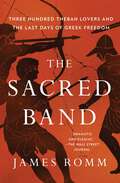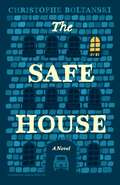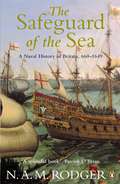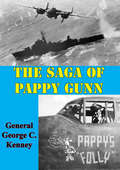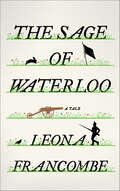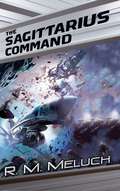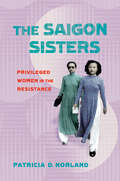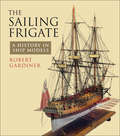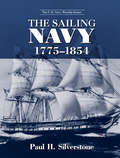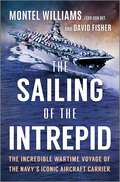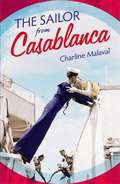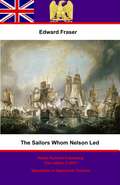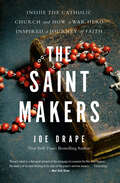- Table View
- List View
The SS on Trial: Evidence from Nuremberg (The\third Reich From Original Sources Ser.)
by Bob CarruthersAn Emmy Award–winning author reveals the complete testimony of the most infamous war crimes trials in human history following WWII—includes photographs. After the defeat of Nazi Germany, the Nuremberg Trials were conducted by the four victorious Allied forces of Great Britain, the United States, France, and the Soviet Union. They were held in the Palace of Justice, Nuremberg, Germany, from November 1945 to October 1946. Famous for prosecuting the major German war criminals, they also tried the various groups and organizations that were at the heart of Nazi Germany. Part of the illustrated series The Third Reich from Original Sources, The SS on Trial presents the complete testimony from the hearings, including the original indictment, the criminal case put forward for the SS, the closing speeches by the prosecution and defense, and the final judgment. Former SS members often wondered why they were charged as war criminals when they merely performed their &“normal&” duty. The Military Tribunal at Nuremberg attempted to answer that question. The witnesses called include Friedrich Karl von Eberstein, an early member of the Nazi Party, the SA, and the SS; Paul Hausser, one of the most eminent leaders of the Waffen-SS who vehemently defended their military role in the war; Georg Konrad Morgen, a former SS judge; and Wolfram Sievers, the Reich manager of the Ahnenerbe. Featuring forty photographs and charts, this indispensable volume explores how the actions of Nazi soldiers challenged humanity&’s notions of criminality and global justice.
The SS-Sonderkommando "Dirlewanger": A Memoir
by Rolf MichaelisA rare look inside the Sonderkommando "Dirlewanger," the SS anti-partisan unit notorious for atrocities in Poland and Russia during World War II. These memoirs were written by a former member of the unit from its formation in 1940 to the end of the war and took part in nearly all its operations. A first hand account of the brutal and barbaric methods used by Dirlewanger against partisans – methods that appalled even some SS commanders – are revealed here in this memoir. SS-Sonderkommando "Dirlewanger" was originally manned by convicted poachers, however as the war progressed replacements were found by emptying prisons and filling the ranks with more hardened criminals. Here are the chilling recollections of a soldier in the SS-Sonderkommando "Dirlewanger" during the Polish and Russian campaigns, the 1944 Warsaw uprising and the final battles near Berlin.
The SS: A New History
by Adrian WealeThe SS was one of the most important institutions of Third Reich Germany, yet it is also among the least well understood. From the end of 1935, the SS had control over all police and internal security duties in Germany and the militarised Waffen SS had more than eight hundred thousand men serving in the field, in direct rivalry with the traditional German armed forces, the Wehrmacht.Making use of material not previously available, this definitive book refocuses attention on and enhances understanding of the hard-nosed political fanatics and opportunists who were responsible for one of the most appalling crimes in human history, the attempted execution of the Jews of Europe.
The Saboteur of Auschwitz: The Inspiring True Story of a British Soldier Held Prisoner in Auschwitz
by Colin RushtonFor fans of The Tattooist of Auschwitz, The Librarian of Auschwitz and The Choice, this is the incredible true story of a British soldier POW.In 1942, young British soldier Arthur Dodd was taken prisoner by the German Army and transported to Oswiecim in Polish Upper Silesia. The Germans gave it another name, now synonymous with mankind’s darkest hours. They called it Auschwitz.Forced to do hard labour, starved and savagely beaten, Arthur thought his life would end in Auschwitz. Determined to go down fighting, he sabotaged Nazi industrial work, risked his life to alleviate the suffering of the Jewish prisoners and aided a partisan group planning a mass break-out.This shocking true story sheds new light on the operations at the camp, exposes a hierarchy of prisoner treatment by the SS and presents the largely unknown story of the military POWs held there.
The Saboteur: A Novel
by Andrew GrossNorwegian commandos aim to destroy the Nazi nuclear program in this World War II thriller of action and espionage by a New York Times–bestselling author.Based on the true story of Operation GunnersideFebruary 1943. Both the Allies and the Nazis are closing in on attempts to construct the decisive weapon of the war . . . Kurt Nordstrum, an engineer in Oslo, puts his life aside to take up arms against the Germans as part of the Norwegian resistance. After the loss of his fiancée, and with his outfit whittled to shreds, he commandeers a coastal steamer and escapes to England to transmit secret evidence of the Nazis’ progress towards an atomic bomb at an isolated factory in Norway. There, he joins a team of dedicated Norwegians in training in the Scottish Highlands for a mission to disrupt the Nazis’ plans before they advance any further.Parachuted onto the most unforgiving terrain in Europe, braving the fiercest of mountain storms, Nordstrum and his team attempt the most daring raid of the war, targeting the heavily-guarded factory built on a shelf of rock thought to be impregnable, a mission even they know they likely will not survive. Months later, Nordstrum is called upon again to do the impossible, opposed by both elite Nazi soldiers and a long-standing enemy who is now a local collaborator—one man against overwhelming odds, with the fate of the war in the balance, but the choice to act means putting the one person he has a chance to love in peril.
The Saboteur: The Aristocrat Who Became France's Most Daring Anti-Nazi Commando
by Paul KixIn the tradition of Agent Zigzag comes this breathtaking biography, as fast-paced and emotionally intuitive as the very best spy thrillers, which illuminates an unsung hero of the French Resistance during World War II—Robert de La Rochefoucald, an aristocrat turned anti-Nazi saboteur—and his daring exploits as a résistant trained by Britain’s Special Operations Executive.A scion of one of the most storied families in France, Robert de La Rochefoucald was raised in magnificent chateaux and educated in Europe's finest schools. When the Nazis invaded and imprisoned his father, La Rochefoucald escaped to England and learned the dark arts of anarchy and combat—cracking safes and planting bombs and killing with his bare hands—from the officers of Special Operations Executive, the collection of British spies, beloved by Winston Churchill, who altered the war in Europe with tactics that earned it notoriety as the “Ministry of Ungentlemanly Warfare.” With his newfound skills, La Rochefoucauld returned to France and organized Resistance cells, blew up fortified compounds and munitions factories, interfered with Germans’ war-time missions, and executed Nazi officers. Caught by the Germans, La Rochefoucald withstood months of torture without cracking, and escaped his own death, not once but twice.The Saboteur recounts La Rochefoucauld’s enthralling adventures, from jumping from a moving truck on his way to his execution to stealing Nazi limos to dressing up in a nun’s habit—one of his many disguises and impersonations. Whatever the mission, whatever the dire circumstance, La Rochefoucauld acquitted himself nobly, with the straight-back aplomb of a man of aristocratic breeding: James Bond before Ian Fleming conjured him.More than just a fast-paced, true thriller, The Saboteur is also a deep dive into an endlessly fascinating historical moment, telling the untold story of a network of commandos that battled evil, bravely worked to change the course of history, and inspired the creation of America’s own Central Intelligence Agency.
The Saboteurs
by William E. Butterworth W.E.B. GriffinW.E.B. Griffin continues his gripping Men at War series, featuring the legendary OSS. As the Battle of the Atlantic rages, German U-boats are sinking U.S. vessels at will. Meanwhile, preparations are being made to invade Sicily and Italy. As the war heats up, "Wild Bill" Donovan and his secret agents find themselves battling on two fronts at once. And fate is about to deal them a surprise that may doom them all.
The Saboteurs (Men at War #5)
by William E. Butterworth IV W.E.B. GriffinIf coincidence had thrown these men together in any normal military organization, and if, improbably, they had become buddies there, any commanding officer with enough sense would have broken up the gang as threats to "good military order and discipline. " But they weren't in any normal military organization. They were in the Office of Strategic Services. <P><P> The Battle of the Atlantic is at its peak. Packs of German U-boats are hunting and sinking U. S. supply ships. Ships are burning at their moorings in U. S. ports, and a series of explosions has afflicted trains and train stations around the country - is it all accidental or is it sabotage? <P><P>Meanwhile, Allied forces are secretly preparing to invade first Sicily and then Italy, and there is a lot of work that needs to be done beforehand, some with the most unlikely of helping hands. As the war heats up, "Wild Bill" Donovan's agents - Dick Canidy, Eric Fulmar, Stan Fine, and the rest of the crew, answerable only to Donovan and the president - suddenly find themselves battling on two fronts at once . . . and fate is just about to deal them a few surprises. <P><P><b>A New York Times Bestseller</b>
The Sabre's Edge: (The Matthew Hervey Adventures: 5):A gripping, action-packed military adventure from bestselling author Allan Mallinson (Matthew Hervey #5)
by Allan MallinsonThe Sunday Times bestselling author Allan Mallinson, brings us another enthralling Matthew Hervey adventure. If you like Patrick O'Brian, Bernard Cornwell and CS Forester, you will love this!"What a hero! What an author! What a book! A joy for the lover of adventure and military buff alike" -- LYN MACDONALD, THE TIMES"Splendid...the tale is as historically stimulating as it is stirringly exciting" -- ANDREW ROBERTS, SUNDAY TELEGRAPH"Impeccably researched and rooted in both time and place" -- ***** Reader review"A thrilling tale" -- ***** Reader review"Allan Malinson tells an absorbing tale and gives a wonderful insight into life at that time." -- ***** Reader review********************************************************************India, 1824: Matthew Hervey and the 6th Light Dragoons are stationed in India, where conflagration looks set to flair.The usurper prince, Durjan Sal, has taken refuge in the infamous fortress of Bhurtpore. A deep ditch, which can be flooded at a moment's notice, runs round it - and as its notorious Tower of Victory - built with the skulls of defeated men - bears witness, it has withstood all attacks made on it.Until now. Hot and dangerous work lies ahead for Matthew Hervey and his courageous troop who know their fortunes will be decided by the sabre's edge.A Sabre's Edge is the fifth book in Allan Mallinson's Matthew Hervey series. His adventures continue in Rumours of War. Have you read his previous adventures A Close Run Thing, The Nizam's Daughters, A Regimental Affair and A Call to Arms?
The Sabre's Edge: A Novel
by Allan MallinsonA nineteenth-century British cavalry captain and his Dragoons must take an impregnable Indian fortress in this adventure by the author of A Call to Arms.1824. The Sixth Light Dragoons are still stationed in India and the talk in the officer’s mess is of war. The Burmese are encroaching on Company land and skirmishes are common on India’s borders. Meanwhile, across the country in Bhurtpoor the succession to the Raj has been usurped. The rightful claimant Balwant Sing has been forced from the throne by the war-mongering Durjan Sal. The conflict looks set to flare up into bloody conflict, taking the surrounding provinces with it. With the threat of war on two fronts the British troops must intercede.The trial ahead will test Hervey and his newly blooded troop to their very limits, for Durjan Sal has taken refuge in the infamous Bhurtpoor—a fortress surrounded by a deep moat almost five miles in perimeter, with thirty-five turreted bastions and the Tower of Victory built with the skulls of Lord Lakes’ defeated men. Hervey can be sure of one thing: the siege of Bhurtpoor will be hot and bloody work. Once again, the fortunes of Matthew Hervey and his courageous troop will be decided by the sabre’s edge.Praise for The Sabre’s Edge“Hervey returns in a thrilling new adventure set in colonial India. . . . Mallinson, himself a cavalry officer, has an almost innate ability to bring both military maneuvers and battle scenes to life. This authentically rousing martial epic evokes all the sweat, gore, and glory of the British Raj.” —Booklist
The Sacking of Fallujah: A People's History (Culture and Politics in the Cold War and Beyond)
by Richard Hil Ross Caputi Donna MulhearnThe Iraqi city of Fallujah has become an epicenter of geopolitical conflict, where foreign powers and non-state actors have repeatedly waged war in residential neighborhoods with staggering humanitarian consequences. The Sacking of Fallujah is the first comprehensive study of the three recent sieges of this city, including those by the United States in 2004 and the Iraqi-led operation to defeat ISIS in 2016. Unlike dominant military accounts that focus on American soldiers and U.S. leaders and perpetuate the myth that the United States "liberated" the city, this book argues that Fallujah was destroyed by coalition forces, leaving public health crises, political destabilization, and mass civilian casualties in their wake. This meticulously researched account cuts through the propaganda to uncover the lived experiences of Fallujans under siege and occupation, and contextualizes these events within a broader history of U.S. policy in the Middle East. Relying on testimony from Iraqi civilians, the work of independent journalists, and documentation from human rights organizations, Ross Caputi, Richard Hil, and Donna Mulhearn place the experiences of Fallujah's residents at the center of this city's recent history.
The Sacred Band: Three Hundred Theban Lovers Fighting to Save Greek Freedom
by James RommFrom classicist James Romm comes a &“striking…fascinating&” (Booklist) deep dive into the last decades of ancient Greek freedom leading up to Alexander the Great&’s destruction of Thebes—and the saga of the greatest military corps of the time, the Theban Sacred Band, a unit composed of 150 pairs of male lovers.The story of the Sacred Band, an elite 300-man corps recruited from pairs of lovers, highlights a chaotic era of ancient Greek history, four decades marked by battles, ideological disputes, and the rise of vicious strongmen. At stake was freedom, democracy, and the fate of Thebes, at this time the leading power of the Greek world. The tale begins in 379 BC, with a group of Theban patriots sneaking into occupied Thebes. Disguised in women&’s clothing, they cut down the agents of Sparta, the state that had cowed much of Greece with its military might. To counter the Spartans, this group of patriots would form the Sacred Band, a corps whose history plays out against a backdrop of Theban democracy, of desperate power struggles between leading city-states, and the new prominence of eros, sexual love, in Greek public life. After four decades without a defeat, the Sacred Band was annihilated by the forces of Philip II of Macedon and his son Alexander in the Battle of Chaeronea—extinguishing Greek liberty for two thousand years. Buried on the battlefield where they fell, they were rediscovered in 1880—some skeletons still in pairs, with arms linked together. From violent combat in city streets to massive clashes on open ground, from ruthless tyrants to bold women who held their era in thrall, The Sacred Band recounts &“in fluent, accessible prose&” (The Wall Street Journal) the twists and turns of a crucial historical moment: the end of the treasured freedom of ancient Greece.
The Safe House: A Novel
by Laura Marris Christophe BoltanskiIn Paris’s exclusive Saint-Germain neighborhood is a mansion. In that mansion lives a family. Deep in that mansion. The Bolts are that family, and they have secrets. The Safe House tells their story. When the Nazis came, Étienne Boltanski divorced his wife and walked out the front door, never to be seen again during the war. So far as the outside world knew, the Jewish doctor had fled. The truth was that he had sneaked back to hide in a secret crawl space at the heart of the house. There he lived for the duration of the war. With the Liberation, Étienne finally emerged, but he and his family were changed forever—anxious, reclusive, yet proudly eccentric. Their lives were spent, amid Bohemian disarray and lingering wartime fears, in the mansion’s recesses or packed comically into the protective cocoon of a Fiat. That house (and its vehicular appendage) are at the heart of Christophe Boltanski’s ingeniously structured, lightly fictionalized account of his grandparents and their extended family. The novel unfolds room by room—each chapter opening with a floorplan— introducing us to the characters who occupy each room, including the narrator’s grandmother--a woman of “savage appetites”--and his uncle Christian, whose haunted artworks would one day make him famous. “The house was a palace,” Boltanski writes, “and they lived like hobos.” Rejecting convention as they’d rejected the outside world, the family never celebrated birthdays, or even marked the passage of time, living instead in permanent stasis, ever more closely bonded to the house itself. The Safe House was a literary sensation when published in France in 2015 and won the Prix de Prix, France’s most prestigious book prize. With hints of Oulipian playfulness and an atmosphere of dark humor, The Safe House is an unforgettable portrait of a self-imprisoned family.
The Safeguard of the Sea: A Naval History of Britain 660-1649
by N A RodgerThroughout Britain's history, one factor above all others has determined the fate of the nation: its navy. N. A. M. Rodger's definitive account reveals how the political and social progress of Britain has been inextricably intertwined with the strength - and weakness - of its sea power, from the desperate early campaigns against the Vikings to the defeat of the great Spanish Armada. Covering policy, strategy, ships, recruitment and weapons, this is a superb tapestry of nearly 1,000 years of maritime history.'No other historian has examined the subject in anything like the detail found here. The result is an outstanding example of narrative history' Barry Unsworth, Sunday Telegraph
The Saga Of Pappy Gunn
by General George C. KenneyFOUR-STAR GENERAL KENNEY pays a remarkable tribute to a remarkable man in this biography. Colonel Paul Irwin ("Pappy") Gunn met a tragic death in an airplane accident in the Philippines on October 11, 1957. Believing that our country owes a debt to a great character, a superb aviator, and a devoted American that has never been paid, General Kenney has written this story in the hope that it will help discharge a part of that debt.General Kenney's own words serve better than any others to describe this book:"This is the story of an extraordinary character. He was one of the great heroes of the Southwest Pacific in World War II, a mechanical genius, and one of the finest storytellers I have ever known. His deeds were real. His stories were often fantasies but they will be told and retold as long as any of his comrades-in-arms are still alive and then will be handed down to succeeding generations of airmen. Pappy Gunn is already a legendary figure."The saga of Pappy Gunn contains a wealth of stories, Spectacular things happened to this spectacular person....As the author points out, "He lived, died, and was even buried differently from other people." Faithfully, but with humor and warmth and understanding, General Kenney has constructed the life story, the saga, of his friend, Pappy Gunn.
The Sage of Waterloo: A Tale
by Leona FrancombeThe most beguiling and distinctive debut novel of the season: the Battle of Waterloo…as told by a rabbit.On June 17, 1815, the Duke of Wellington amassed his troops at Hougoumont, an ancient farmstead not far from Waterloo. The next day, the French attacked—the first shots of the Battle of Waterloo—sparking a brutal, day-long skirmish that left six thousand men either dead or wounded.William is a white rabbit living at Hougoumont today. Under the tutelage of his mysterious and wise grandmother Old Lavender, William attunes himself to the echoes and ghosts of the battle, and through a series of adventures he comes to recognize how deeply what happened at Waterloo two hundred years before continues to reverberate. “Nature,” as Old Lavender says, “never truly recovers from human cataclysms.”The Sage of Waterloo is a playful retelling of a key turning point in human history, full of vivid insights about Napoleon, Wellington, and the battle itself—and a slyly profound reflection on our place in the world.
The Sagittarius Command (Tour of the Merrimack #3)
by R. M. MeluchThe Earth space forces, spearheaded by the United States, have long been at war with the forces of the Palatine Empire, a neo-Roman culture that broke away from Earth's control long ago. The pride of the U.S. space fleet is the battle class starship, the U.S.S. Merrimack, commanded by Captain John Farragut. But when the alien life-form known as the Hive-a biological force whose only imperative is: seek and devour-begins wreaking destruction across the galaxy, the Romans are forced to turn to Earth for help. Caesar Magnus surrenders to Captain Farragut, and the period known as the Subjugation begins. Ever since the surrender, an uneasy peace and alliance have been in force, as all humanity and their alien allies join together to battle the Hive. When a near-space Roman world is besieged by the Hive, Merrimack comes to the rescue in the nick of time. But what they learn from this unexpected attack is that there is no safe place in near or deep space when it comes to the Hive. Yet they also discover some clues which send Earth and Roman ships alike on a joint mission to a far-distant world in the heart of Hive territory-a world that they have begun to suspect is home to one of the greatest geniuses of all time, a Roman who has been presumed dead; for decades. If he is still alive he may be the only person who has figured out how to counteract and control the Hive. He may be humankind's last hope for survival-or the engineer of the destruction of both Earth and Palatine.
The Saigon Sisters: Privileged Women in the Resistance (NIU Southeast Asian Series)
by Patricia D. NorlandThe Saigon Sisters offers the narratives of a group of privileged women who were immersed in a French lycée and later rebelled and fought for independence, starting with France's occupation of Vietnam and continuing through US involvement and life after war ends in 1975.Tracing the lives of nine women, The Saigon Sisters reveals these women's stories as they forsook safety and comfort to struggle for independence, and describes how they adapted to life in the jungle, whether facing bombing raids, malaria, deadly snakes, or other trials. How did they juggle double lives working for the resistance in Saigon? How could they endure having to rely on family members to raise their own children? Why, after being sent to study abroad by anxious parents, did several women choose to return to serve their country? How could they bear open-ended separation from their husbands? How did they cope with sending their children to villages to escape the bombings of Hanoi? In spite of the maelstrom of war, how did they forge careers? And how, in spite of dislocation and distrust following the end of the war in 1975, did these women find each other and rekindle their friendships? Patricia D. Norland answers these questions and more in this powerful and personal approach to history.
The Sailing Frigate: A History in Ship Models
by Robert GardinerA technical history of the ship from 1600 to 1850 through models, with informative illustrations and text, by the author of Warships of the Napoleonic Era. The National Maritime Museum in Greenwich, London, houses the largest collection of scale ship models in the world. Many of the models are official, contemporary artifacts made by the craftsmen of the Royal Navy or the shipbuilders themselves, ranging from the mid-seventeenth century to the present day. As such they represent a three-dimensional archive of unique importance and authority. Treated as historical evidence, they offer more detail than even the best plans, and demonstrate exactly what the ships looked like in a way that even the finest marine painter could not achieve. This book tells the story of the evolution of the cruising ship under sail. It includes many model photos, all in full color, as well as close-up and detail views. These are captioned in depth, but many are also annotated to focus attention on interesting or unusual features. Although pictorial in emphasis, The Sailing Frigate weaves the pictures into an authoritative text, producing an unusual and attractive form of technical history. While the series will be of particular interest to ship modelers, all those with an interest in ship design and development will be attracted to the in-depth analysis of these beautifully presented books.
The Sailing Navy, 1775-1854 (The U.S. Navy Warship Series)
by Paul SilverstoneThe Sailing Navy, 1775-1854, the first volume in the definitive five-volume U.S. Navy Warship series, comprehensively details all aspects of the ships that sailed in the nascent stages of the U.S. Navy. From its beginnings as battlers of Barbary Coast pirates, to challenging the awesome might of the Royal Navy in the War of 1812, to the historic blockade that proved instrumental in winning the Mexican-American War, the sailing ships foreshadowed the daring and resolve of the later U.S. Navy. With its all-inclusive lists of data, The Sailing Navy is the most in-depth resource available on the ships that shaped the early history of the U.S. Navy. Each volume in the U.S. Navy Warship series represents the most meticulous scholarship for its particular era, providing an authoritative account of every ship in the history of the U. S. Navy from its first incarnation as the Continental Navy to its present position as one of the world’s most formidable naval superpowers. Featuring convenient, easy-to-read tabular lists, every book in the series includes an abundance of illustrations, some never before published, along with figures for actions fought, damages sustained, casualties suffered, prizes taken, and ships sunk, ultimately making the series an indispensable reference tool for maritime buffs and military historians alike. A further article about Paul Silverstone and the Navy Warships series can be found at: http://www.thejc.com/home.aspxParentId=m11s18s180&SecId=180&AId=58892&ATypeId=1
The Sailing of the Intrepid: The Incredible Wartime Voyage of the Navy’s Iconic Aircraft Carrier
by Montel WilliamsFrom twenty-two-year naval and marine veteran Montel Williams comes a page-turning history of how one World War II aircraft carrier&’s crew defied all odds, redefining the very meaning of what it means to struggle, persevere and survive.1944. The USS Intrepid set sail on its first combat voyage, only to be struck by a Japanese torpedo plane, jamming its rudder at a forty-five-degree angle. It could only sail in circles amid treacherous waters.The task force abandoned ship as it tried to make the 3,300-mile voyage to Pearl Harbor. For a day, the captain was able to slalom, alternating use of the ship&’s engines, but the seas became too perilous. Until one resilient crewman came up with the ingenious idea of rigging a 3,000 square-foot high sail on the second deck to steer the ship home safe. Incredibly, the makeshift sail proved to be their ticket to the shorelines.With grit and determination, this spellbinding story details a remarkable survival story against all odds, for readers of Tom Clavin and Bob Drury.
The Sailor from Casablanca: A summer read full of passion and betrayal, set between Golden Age Casablanca and the present day
by Charline MalavalA spellbinding story of love and betrayal for fans of Santa Montefiore, Fiona Valpy's The Beekeeper's Promise and Dinah Jefferies. Perfect for book clubs! ***Shortlisted for the Filigranes Prize******RATED 5 STARS BY REAL READERS***"I couldn't turn the pages fast enough!" -5* Amazon review"A story full of mysteries and romance, set against the sumptuous backdrop of Casablanca." -5* Amazon review"An exceptional debut" -Les Livres d'Eve blog "A novel full of warmth, emotions and exoticism." -Le PopulaireTall, brilliant and ambitious, eighteen-year-old sailor Guillaume has the world at his feet when he steps onto the shores of Casablanca in April 1940. But his dreams of travelling the world are cut short when he dies in a warship explosion in the harbour of Casablanca.Sixty-five years later in 2005, as Loubna fights to open a cinema in the bustling harbourside city, the young woman discovers the mystery of the sailor from Casablanca . . . and a suitcase full of her grandfather Guillaume's love letters. But could it be that the boy everyone has supposed dead for over half a century is still alive?And if so - did he run away with one of his countless girlfriends all these years ago?As Loubna searches for answers, she finds herself swept up in an epic story of love, passion, intrigue and betrayal, set in the enchantingly glamorous heart of Golden Age Casablanca.
The Sailor from Casablanca: A summer read full of passion and betrayal, set between Golden Age Casablanca and the present day
by Charline MalavalA spellbinding story of love and betrayal for fans of Santa Montefiore, Fiona Valpy's The Beekeeper's Promise and Dinah Jefferies. Perfect for book clubs!***Shortlisted for the Filigranes Prize******RATED 5 STARS BY REAL READERS***"I couldn't turn the pages fast enough!" -5* Amazon review"A story full of mysteries and romance, set against the sumptuous backdrop of Casablanca." -5* Amazon review"An exceptional debut" -Les Livres d'Eve blog"A novel full of warmth, emotions and exoticism." -Le PopulaireTall, brilliant and ambitious, eighteen-year-old sailor Guillaume has the world at his feet when he steps onto the shores of Casablanca in April 1940. But his dreams of travelling the world are cut short when he dies in a warship explosion in the harbour of Casablanca.Sixty-five years later in 2005, as Loubna fights to open a cinema in the bustling harbourside city, the young woman discovers the mystery of the sailor from Casablanca . . . and a suitcase full of her grandfather Guillaume's love letters. But could it be that the boy everyone has supposed dead for over half a century is still alive?And if so - did he run away with one of his countless girlfriends all these years ago?As Loubna searches for answers, she finds herself swept up in an epic story of love, passion, intrigue and betrayal, set in the enchantingly glamorous heart of Golden Age Casablanca.
The Sailors Whom Nelson Led: Their Doings Described By Themselves (classic Reprint)
by Edward FraserThis ebook is purpose built and is proof-read and re-type set from the original to provide an outstanding experience of reflowing text for an ebook reader. Of the many famous, courageous leaders of the Napoleonic Wars, and on sea beyond that era, few stand as high in estimation as Horatio Nelson, lauded by his countrymen, respected by his enemies, and despite his lack of understanding of warfare on the waves by the Emperor Napoleon himself. His tale of glory was short but blazingly bright, terminating at Trafalgar in 1805, having made his name at the battle of the Nile and Copenhagen earlier in the wars. However, the wars with France thereafter did not terminate until 1815, with a brief respite in 1814; how then, without Nelson, was the supremacy of the Royal Navy maintained? Edward Fraser provides a good deal of the answer in his book, which seeks to sketch a picture of the captains, officers, and sailors who executed Nelson's orders with gusto, determination and, in many cases, with some of their own flair. The "Band of Brothers" that Nelson led and inspired are described in detail - their actions and deeds, which may have been outshone by those of their leader - but they were great fighting men in their own right, Codrington, Suamarez, Troubridge et al. Fraser is adept at using the sources of all ranks and includes the ordinary seaman's view as well as more junior officers, to complete the view of the sailors who fought and won the war on the seas. Highly recommended. Text taken, whole and complete, from the 1913 edition, published by Methuen and Co Ltd., London. Original -353 pages Illustrations - 16 - all included Maps - 4 - all included Author - Edward Fraser - (????-????) Linked TOC.
The Saint Makers: Inside the Catholic Church and How a War Hero Inspired a Journey of Faith
by Joe DrapePart biography of a wartime adventurer, part detective story, and part faith journey, this intriguing book from New York Times journalist and bestselling author Joe Drape takes us inside the modern-day process of the making of a saint.The Saint Makers chronicles the unlikely alliance between Father Hotze and Dr. Andrea Ambrosi, a country priest and a cosmopolitan Italian canon lawyer, as the two piece together the life of a long dead Korean War hero and military chaplain and fashion it into a case for eternal divinity. Joe Drape offers a front row seat to the Catholic Church's saint-making machinery-which, in many ways, has changed little in two thousand years-and examines how, or if, faith and science can co-exist.This rich and unique narrative leads from the plains of Kansas to the opulent halls of the Vatican, through brutal Korean War prison camps, and into the stories of two individuals, Avery Gerleman and Chase Kear, whose lives were threatened by illness and injury and whose family and friends prayed to Father Kapaun, sparking miraculous recoveries in the heart of America. Gerleman is now a nurse, and Kear works as a mechanic in the aerospace industry. Both remain devoted to Father Kapaun, whose opportunity for sainthood relies in their belief and medical charts. At a time when the church has faced severe scandal and damage, and the world is at the mercy of a pandemic, this is an uplifting story about a priest who continues to an example of goodness and faith.Ultimately, The Saint Makers is the story of a journey of faith -- for two priests separated by seventy years, for the two young athletes who were miraculously brought back to life with (or without) the intercession of the divine, as well as for readers -- and the author -- trying to understand and accept what makes a person truly worthy of the Congregation of Saints in the eyes of the Catholic Church.
